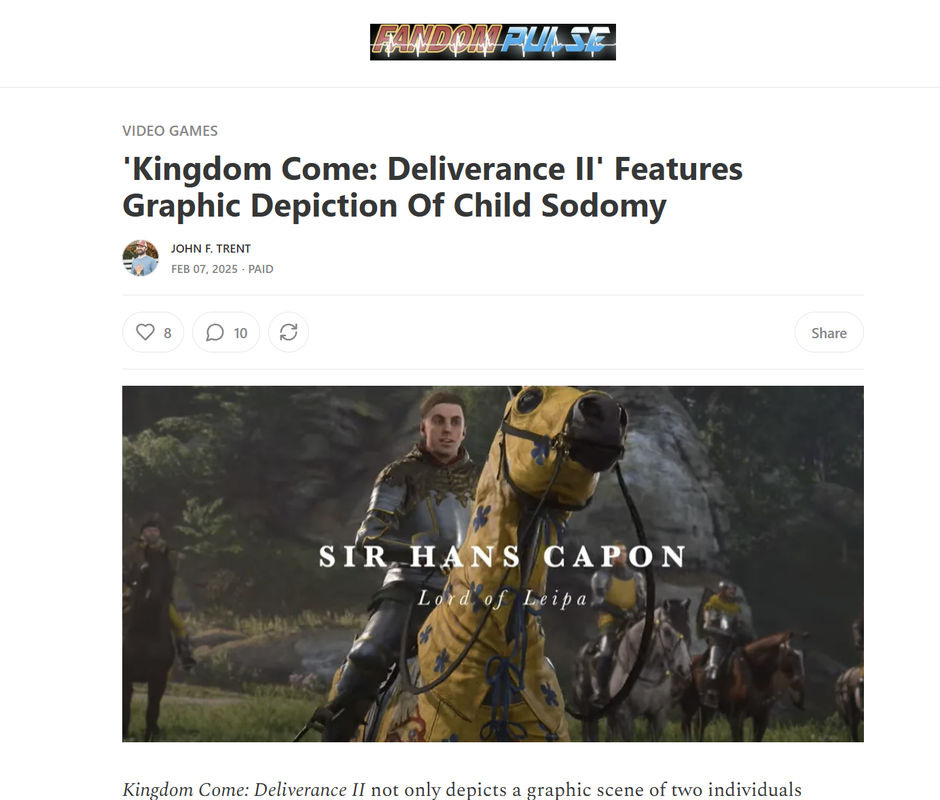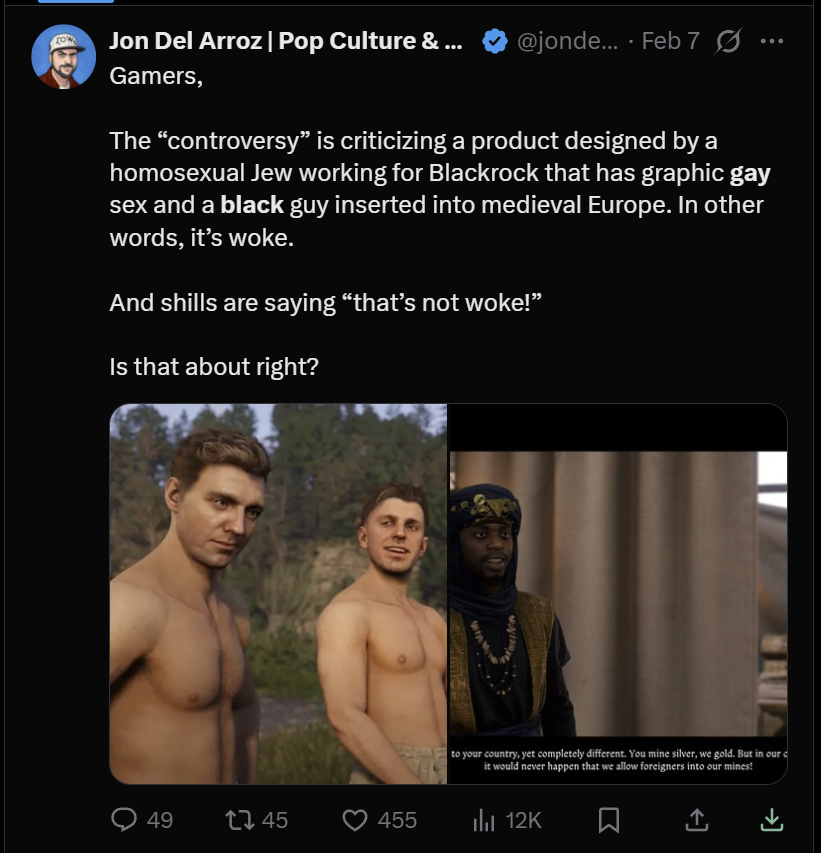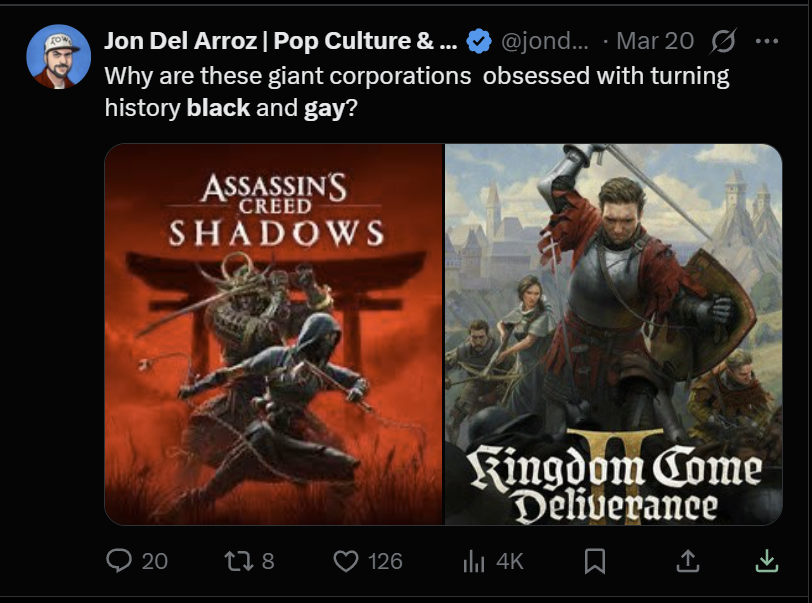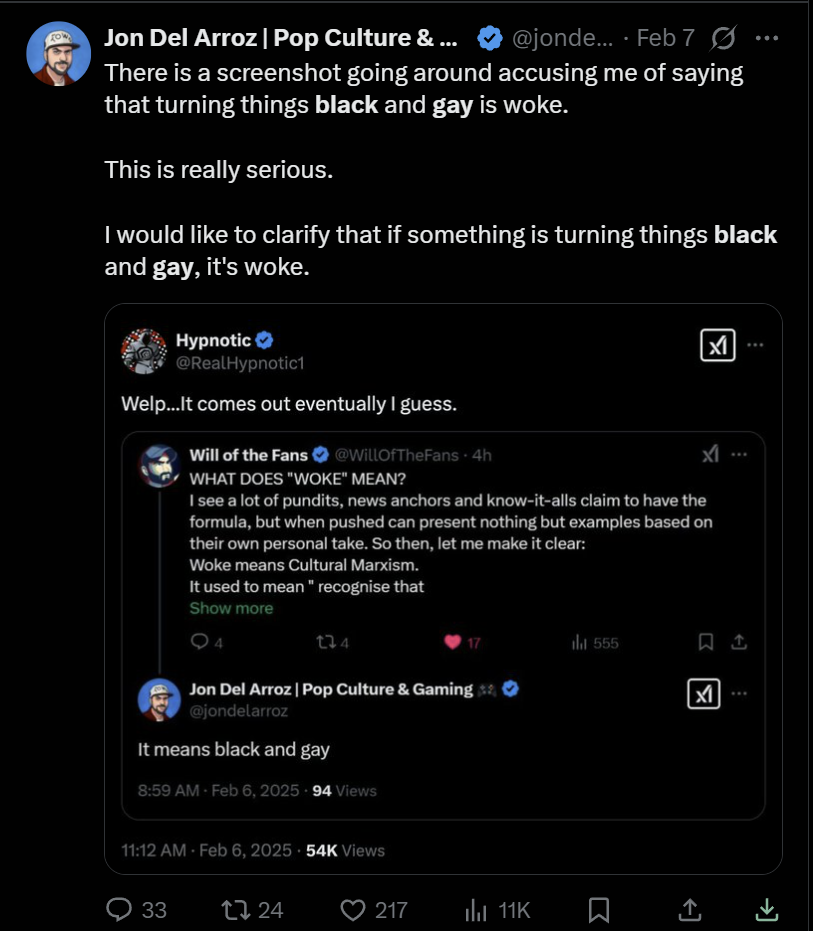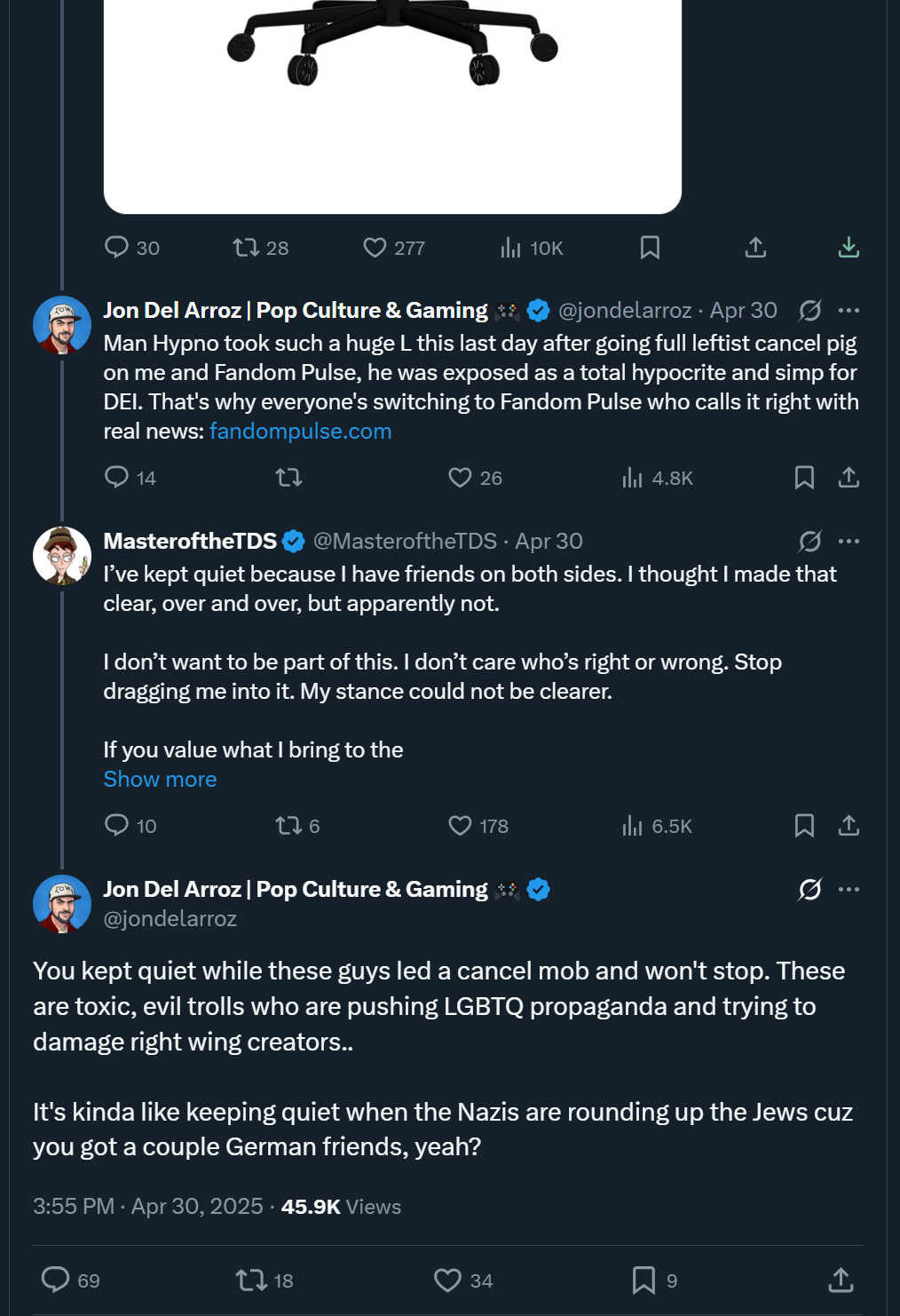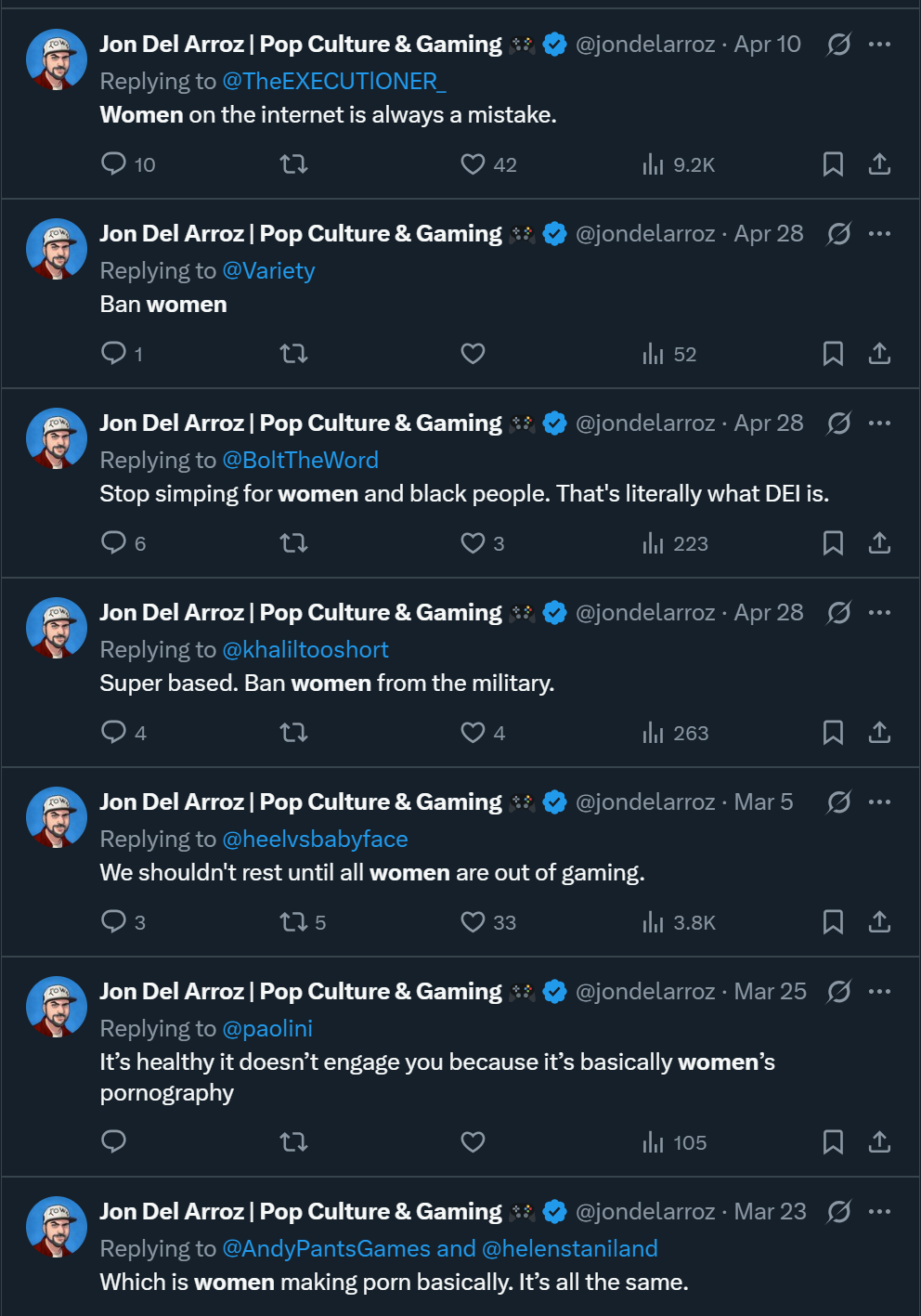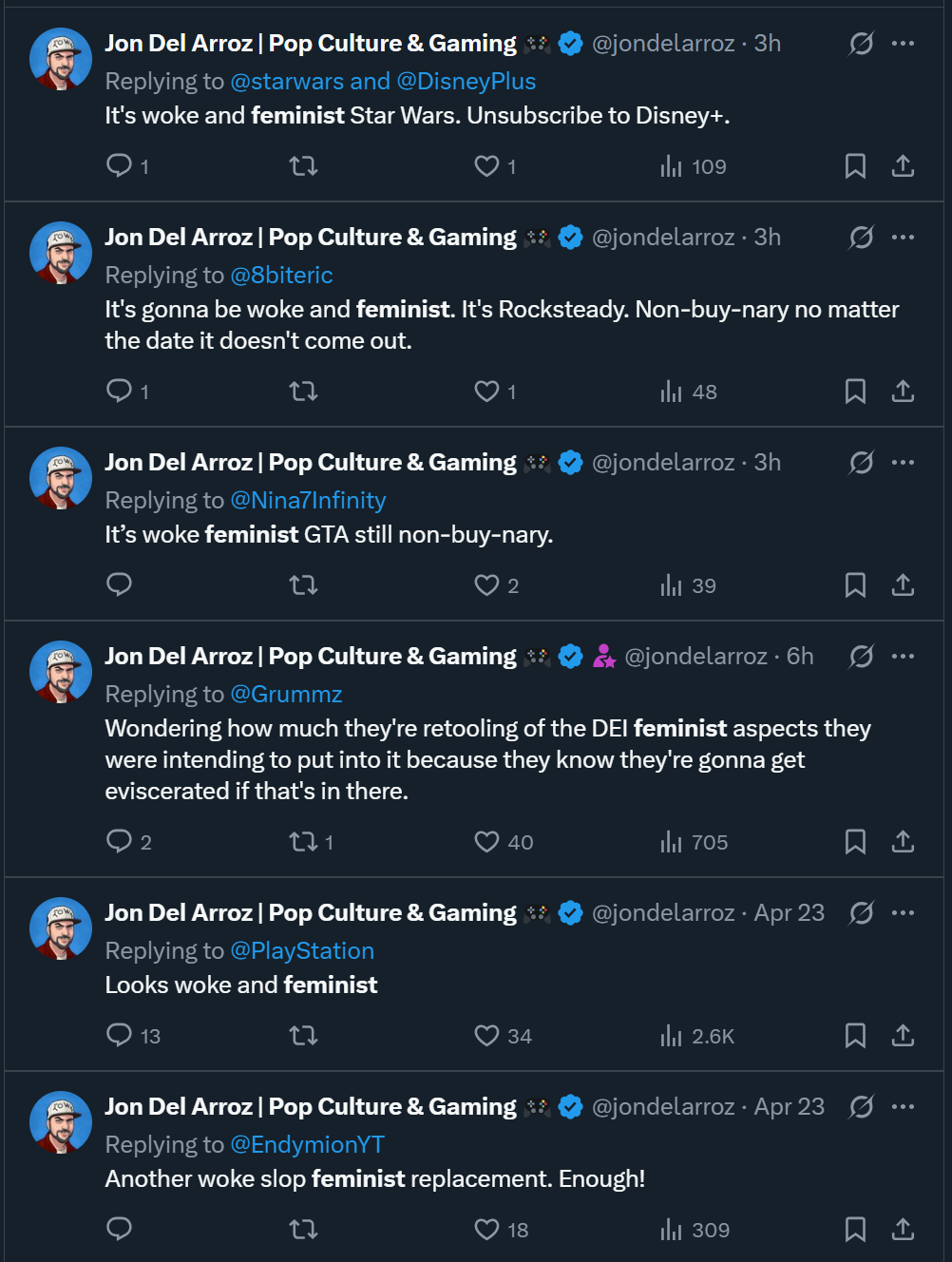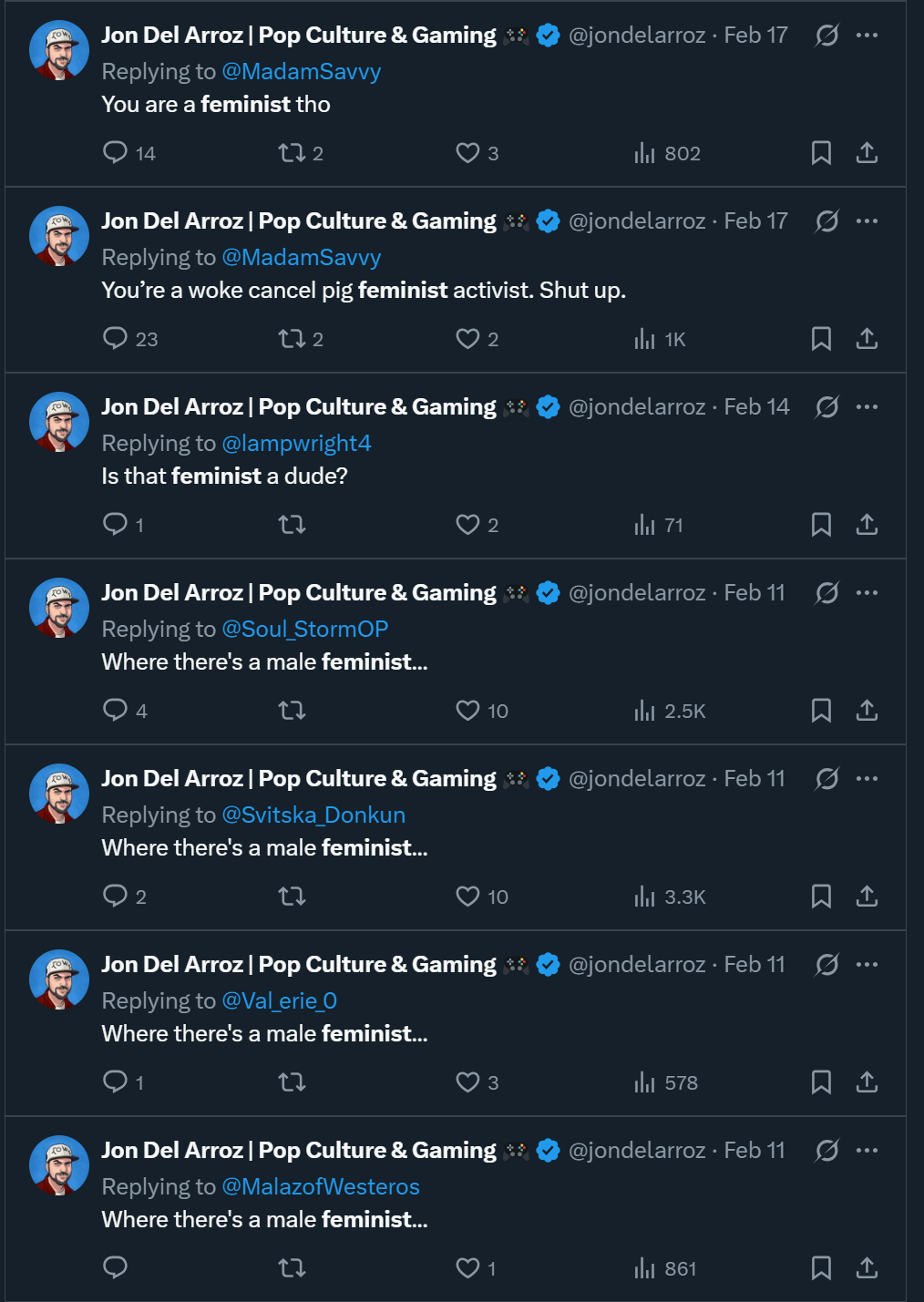JDA and Smash JT Clash
A Microcosm of Gaming's Culture War
Note: This is my opinion of an online exchange between two content creators.
Note: This is my opinion of an online exchange between two content creators.
A contentious livestream featuring YouTubers Jon Del Arroz, Smash JT, and conservative commentator Vox Day aimed to mend disputes and unite against perceived "woke" influences in gaming journalism. Instead, it devolved into a chaotic clash of personal attacks, ideological divides, and ethical contradictions. This was exacerbated by JDA’s inflammatory posts on X and dubious articles from Fandom Pulse. The discussion, rife with accusations of anti-Semitism, slander, and hypocrisy, reflects the broader culture war within gaming, highlighting irreconcilable differences in ethics, ideology, and methodology among the anti-woke community.
Fractured Dialogue
JDA and Smash JT, both vocal critics of "woke" outlets like Kotaku and Polygon, sought to resolve their online feud with Vox Day joining them to oppose corporate and ideological shifts in gaming. However, the conversation quickly devolved into personal disputes and ideological clashes. JDA’s toxic behavior on X—including a Nazi metaphor targeting Jewish creator Master of the TDS (whose family survived the Holocaust), an unapologetic admission of using the "n-word" in gaming chats, and baseless claims labeling critics as “pedophile supporters”—seriously undermined his credibility. His attacks on women such as Heather Antos, Cat Rambo, and Jamie Marchi, often filled with misogynistic remarks, further eroded his calls for unity, revealing significant factionalism within their ranks.
The Decline of Gaming Journalism
Initially, the trio agreed on the decline of gaming journalism, criticizing Polygon layoffs, Valnet’s AI-driven content, and the shift from thorough game completion to activism-driven reporting. Vox Day contrasted past standards—where reviewers typically finished games—with modern practices, while JDA’s Fandom Pulse platform condemned mainstream outlets as corporate mouthpieces. However, when JDA admitted to not playing critiqued games like *Kingdom Come: Deliverance 2*, relying on secondhand sources, he faced accusations of sensationalism similar to the outlets he criticized. This admission weakened the authenticity of his critiques, especially when paired with unverified claims from Fandom Pulse, undermining his journalistic integrity.
The DEI Divide: Woke Culture in Gaming
The debate intensified over Diversity, Equity, and Inclusion (DEI) and "woke" culture, with *Kingdom Come: Deliverance 2* becoming a flashpoint. JDA and Vox Day adopted a hardline stance, viewing DEI as harmful ideologically and condemning the game’s Black character and optional LGBTQ+ content as examples of “woke” corruption by developer Daniel Vavra and Embracer Group. JDA framed these elements as leftist agendas in his Fandom Pulse articles, often linking them to entities like BlackRock. His posts on X reinforced this view, stating, “If something is turning things black and gay, it’s woke,” equating Black and LGBTQ+ representation with ideological decay. His failure to play the games he critiques casts doubt on the depth of his arguments.
Fandom Pulse’s coverage of *Kingdom Come: Deliverance 2* revealed a mixed approach. A January 17, 2025, article, “Report: *Kingdom Come: Deliverance II* Features LGBTQ+ 'Romantic Conversation Options,'” neutrally reported on the game’s LGBTQ+ content, citing reputable sources like Insider Gaming, The Gamer, and IGN. However, a February 7, 2025, article titled “‘Kingdom Come: Deliverance II’ Features Graphic Depiction Of Child Sodomy” made an inflammatory claim about the game depicting “child sodomy” involving a teenager, without support from sources like The Gamer or IGN, which confirmed only adult romance options. This sensationalism drew criticism on platforms like Reddit’s r/KotakuInAction, as the article appeared to rely on baseless accusations. Together with JDA’s admission of not having played the game, this emphasized a pattern of provocative reporting that further damaged his credibility.
Smash JT, who advocates for apolitical gaming, questioned JDA’s broad “woke” label, suggesting that Vavra’s decisions might be driven by artistic intent. This led to accusations from JDA of equivocation and indirect support for “woke” developers. In response, Smash JT argued that JDA’s unverified claims mirrored Kotaku’s sensationalism, illustrating an ideological divide: JDA’s zero-tolerance stance versus Smash JT’s call for nuance and accountability.
Personal Grievances and Ethical Contradictions
Personal disputes dominated the conversation, revealing deep mistrust. Smash JT condemned JDA’s Nazi metaphor while speaking to a Jewish man as an inflamitory stance and anti-Semitic, prompting JDA to defend it by referencing Gina Carano’s similar analogy and dismissing the offense.
The contexts used however could not be more different as JDA used it intending to cause harm. His Nazi metaphor was personal, directed at a specific individual (Master of the TDS) in a niche online dispute about a Meme of a chair that had nothing to do with JDA. Gina Carano’s metaphor was general, addressing systemic political division and cancel culture without singling out individuals.
In a 2017 blog post titled “What YOU Like Is Literally Hitler,” JDA satirically critiqued the overuse of Nazi comparisons, arguing it dilutes their meaning. This suggests he is aware of the rhetorical weight of such analogies but uses them selectively to provoke or mock opponents.
His commentary escalated, including jabs like “Jews in your basement” and references to “white children” to provoke Smash JT, alongside allegations against the Science Fiction and Fantasy Writers of America (SFWA) as “pedophile supporters.” These comments mirrored the slander that he accused others of engaging in. His derogatory remarks about women, referring to feminists like Roxane Gay and Kate Leth as “extremist, leftist, SJWs” and mocking Antos, Rambo, and Mary Robinette Kowal, further illustrate his anti-feminist stance, which has been apparent since his critique of Marvel in 2017.
JDA framed his rhetoric as a defensive response to being labeled as racist or anti-Semitic, arguing that his bold language was necessary to counter leftist cultural dominance. He and Vox Day positioned their actions as part of a cultural battle, with JDA's transparency about opposing diversity, equity, and inclusion (DEI), pornography, and certain content contrasting with the "sneaky" agendas he perceived in his critics. Although he apologized for his harsh words and expressed a desire to unite against entities like Embracer Group, his continued attacks on X—labeling critics as pedophiles, mocking women, and equating Black and gay content with "woke"—demonstrated a defensiveness. His admission that he does not play the games he critiques, combined with the inflammatory article from Fandom Pulse regarding *Kingdom Come: Deliverance 2*, undermined his journalistic credibility.
A Fractured Movement
The livestream concluded without resolution, as JDA apologized for his personal attacks but urged Smash JT to retract his accusations of racism and anti-Semitism. Smash JT remained firm, describing JDA's rhetoric as "abhorrent." This exchange, fueled by JDA's toxic activity on X, the unverified Fandom Pulse article, and Smash JT's push for accountability, highlighted the factionalism within the anti-woke community.
While JDA’s stance remained consistent, it reflected the same personal attacks, ideological impositions, and misrepresentations he criticized, exemplified by his baseless claim of “child sodomy.” As JDA, Smash JT, and their peers navigate this cultural battleground, their inability to reconcile their differences suggests that the gaming culture war will remain fragmented, with credibility and unity as primary casualties. The inflammatory nature of some Fandom Pulse articles and JDA's provocative rhetoric further complicate the challenge of maintaining journalistic integrity in a polarized discourse, contributing to the fragmentation of the anti-woke movement's efforts to present a cohesive front.
Fractured Dialogue
JDA and Smash JT, both vocal critics of "woke" outlets like Kotaku and Polygon, sought to resolve their online feud with Vox Day joining them to oppose corporate and ideological shifts in gaming. However, the conversation quickly devolved into personal disputes and ideological clashes. JDA’s toxic behavior on X—including a Nazi metaphor targeting Jewish creator Master of the TDS (whose family survived the Holocaust), an unapologetic admission of using the "n-word" in gaming chats, and baseless claims labeling critics as “pedophile supporters”—seriously undermined his credibility. His attacks on women such as Heather Antos, Cat Rambo, and Jamie Marchi, often filled with misogynistic remarks, further eroded his calls for unity, revealing significant factionalism within their ranks.
The Decline of Gaming Journalism
Initially, the trio agreed on the decline of gaming journalism, criticizing Polygon layoffs, Valnet’s AI-driven content, and the shift from thorough game completion to activism-driven reporting. Vox Day contrasted past standards—where reviewers typically finished games—with modern practices, while JDA’s Fandom Pulse platform condemned mainstream outlets as corporate mouthpieces. However, when JDA admitted to not playing critiqued games like *Kingdom Come: Deliverance 2*, relying on secondhand sources, he faced accusations of sensationalism similar to the outlets he criticized. This admission weakened the authenticity of his critiques, especially when paired with unverified claims from Fandom Pulse, undermining his journalistic integrity.
The DEI Divide: Woke Culture in Gaming
The debate intensified over Diversity, Equity, and Inclusion (DEI) and "woke" culture, with *Kingdom Come: Deliverance 2* becoming a flashpoint. JDA and Vox Day adopted a hardline stance, viewing DEI as harmful ideologically and condemning the game’s Black character and optional LGBTQ+ content as examples of “woke” corruption by developer Daniel Vavra and Embracer Group. JDA framed these elements as leftist agendas in his Fandom Pulse articles, often linking them to entities like BlackRock. His posts on X reinforced this view, stating, “If something is turning things black and gay, it’s woke,” equating Black and LGBTQ+ representation with ideological decay. His failure to play the games he critiques casts doubt on the depth of his arguments.
Fandom Pulse’s coverage of *Kingdom Come: Deliverance 2* revealed a mixed approach. A January 17, 2025, article, “Report: *Kingdom Come: Deliverance II* Features LGBTQ+ 'Romantic Conversation Options,'” neutrally reported on the game’s LGBTQ+ content, citing reputable sources like Insider Gaming, The Gamer, and IGN. However, a February 7, 2025, article titled “‘Kingdom Come: Deliverance II’ Features Graphic Depiction Of Child Sodomy” made an inflammatory claim about the game depicting “child sodomy” involving a teenager, without support from sources like The Gamer or IGN, which confirmed only adult romance options. This sensationalism drew criticism on platforms like Reddit’s r/KotakuInAction, as the article appeared to rely on baseless accusations. Together with JDA’s admission of not having played the game, this emphasized a pattern of provocative reporting that further damaged his credibility.
Smash JT, who advocates for apolitical gaming, questioned JDA’s broad “woke” label, suggesting that Vavra’s decisions might be driven by artistic intent. This led to accusations from JDA of equivocation and indirect support for “woke” developers. In response, Smash JT argued that JDA’s unverified claims mirrored Kotaku’s sensationalism, illustrating an ideological divide: JDA’s zero-tolerance stance versus Smash JT’s call for nuance and accountability.
Personal Grievances and Ethical Contradictions
Personal disputes dominated the conversation, revealing deep mistrust. Smash JT condemned JDA’s Nazi metaphor while speaking to a Jewish man as an inflamitory stance and anti-Semitic, prompting JDA to defend it by referencing Gina Carano’s similar analogy and dismissing the offense.
The contexts used however could not be more different as JDA used it intending to cause harm. His Nazi metaphor was personal, directed at a specific individual (Master of the TDS) in a niche online dispute about a Meme of a chair that had nothing to do with JDA. Gina Carano’s metaphor was general, addressing systemic political division and cancel culture without singling out individuals.
In a 2017 blog post titled “What YOU Like Is Literally Hitler,” JDA satirically critiqued the overuse of Nazi comparisons, arguing it dilutes their meaning. This suggests he is aware of the rhetorical weight of such analogies but uses them selectively to provoke or mock opponents.
His commentary escalated, including jabs like “Jews in your basement” and references to “white children” to provoke Smash JT, alongside allegations against the Science Fiction and Fantasy Writers of America (SFWA) as “pedophile supporters.” These comments mirrored the slander that he accused others of engaging in. His derogatory remarks about women, referring to feminists like Roxane Gay and Kate Leth as “extremist, leftist, SJWs” and mocking Antos, Rambo, and Mary Robinette Kowal, further illustrate his anti-feminist stance, which has been apparent since his critique of Marvel in 2017.
- Personal Attacks and Slander: JDA accused Smash JT of slandering him and RazorFist, yet his own X posts labeling critics “pedophile supporters” or "Pedo" and mocking women and making highly inflammatory comments pompously to offend people mirrored the attacks he condemned.
- Pushing Ideological Agendas: JDA criticized "woke" agendas; however, he advocated for banning anything he considers pornography and opposed any LGBTQ content, as well as representations of Black people in games he feels should not be present. This reflects his own prescriptive stance, which mirrors the control he criticized in activists. It seems to me that he embodies the very qualities he detests in others.
- Gossip and Misrepresentation: JDA called out Smash JT for gossip, but his claims that the “gay furry” is smashes fans in speculative. JDA's inflammatory gaming commentary about many games and the alleged use of a woman's photograph from Spain as his female X profile picture with she/her pronouns indicates he may be the deceptive one.
JDA framed his rhetoric as a defensive response to being labeled as racist or anti-Semitic, arguing that his bold language was necessary to counter leftist cultural dominance. He and Vox Day positioned their actions as part of a cultural battle, with JDA's transparency about opposing diversity, equity, and inclusion (DEI), pornography, and certain content contrasting with the "sneaky" agendas he perceived in his critics. Although he apologized for his harsh words and expressed a desire to unite against entities like Embracer Group, his continued attacks on X—labeling critics as pedophiles, mocking women, and equating Black and gay content with "woke"—demonstrated a defensiveness. His admission that he does not play the games he critiques, combined with the inflammatory article from Fandom Pulse regarding *Kingdom Come: Deliverance 2*, undermined his journalistic credibility.
A Fractured Movement
The livestream concluded without resolution, as JDA apologized for his personal attacks but urged Smash JT to retract his accusations of racism and anti-Semitism. Smash JT remained firm, describing JDA's rhetoric as "abhorrent." This exchange, fueled by JDA's toxic activity on X, the unverified Fandom Pulse article, and Smash JT's push for accountability, highlighted the factionalism within the anti-woke community.
While JDA’s stance remained consistent, it reflected the same personal attacks, ideological impositions, and misrepresentations he criticized, exemplified by his baseless claim of “child sodomy.” As JDA, Smash JT, and their peers navigate this cultural battleground, their inability to reconcile their differences suggests that the gaming culture war will remain fragmented, with credibility and unity as primary casualties. The inflammatory nature of some Fandom Pulse articles and JDA's provocative rhetoric further complicate the challenge of maintaining journalistic integrity in a polarized discourse, contributing to the fragmentation of the anti-woke movement's efforts to present a cohesive front.
JDA evidence links
Calling people Pedos
https://x.com/search?q=from%3Ajondelarroz%20pedo&src=typed_query
Gay and black
https://x.com/search?q=from%3Ajondelarroz%20Gay%20and%20black&src=typed_query
Fandom Pulse child sodamy claims
https://fandompulse.substack.com/p/kingdom-come-deliverance-ii-features?utm_source=publication-search
Master of the TDS
https://x.com/jondelarroz/status/1917684176943472710
Feminists
https://x.com/search?q=from%3Ajondelarroz%20%20feminist&src=typed_query&f=live
Calling people Pedos
https://x.com/search?q=from%3Ajondelarroz%20pedo&src=typed_query
Gay and black
https://x.com/search?q=from%3Ajondelarroz%20Gay%20and%20black&src=typed_query
Fandom Pulse child sodamy claims
https://fandompulse.substack.com/p/kingdom-come-deliverance-ii-features?utm_source=publication-search
Master of the TDS
https://x.com/jondelarroz/status/1917684176943472710
Feminists
https://x.com/search?q=from%3Ajondelarroz%20%20feminist&src=typed_query&f=live
Text Transcript done by AI
Your browser does not support viewing this document. Click here to download the document.

